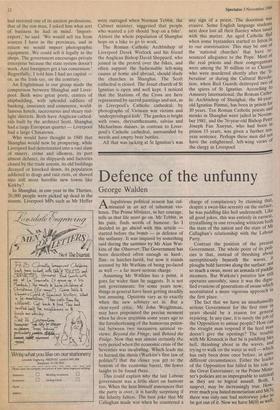Defence of the unfunny .
George Walden
Alugubrious political season has cul- minated in an act of inhuman vio- lence. The Prime Minister, in her courage, tells us that life must go on. Mr Tebbit, in his pain, finds words of humour. So I decided to go ahead with this article started before the bomb — in defence of the unfunny. It was inspired by something said during the summer by Mr Alan Wat- kins of the Observer. The Government has been described often enough as hard-, flint- or hatchet-faced, but now it stands accused by Mr Watkins of being po-faced as well — a far more serious charge.
Assuming Mr Watkins has a point, it goes far wider than he suggests. It is not just governments: for some years now, things in general have been getting steadily less amusing. Opinions vary as to exactly when the new sobriety set in. But a clear-eyed critic, Mr John Weightman, may have pinpointed the precise moment when he drew attention some years ago to the foreshortening of the humorous poten- tial between two successive satirical re- views: Beyond the Fringe, and Behind the Fridge. Now that was almost certainly the very period when the economic crisis of the Seventies was incubating. Which leads me to hazard the thesis (Watkins's first law of politics?) that the closer you get, to the bottom of the economic barrel, the fewer laughs to be found there.
This could explain why the last Labour government was a little short on humour too. When the host himself announces that the party is over, it is hardly surprising if the hilarity falters. The best joke that Mr Callaghan made was when he countered a
charge of complacency by claiming that, despite a swan-like serenity on the surface, he was paddling like hell underneath. Like all good jokes, this was entirely in earnest, crystallising in one revealing witticism both the state of the nation and the state of Mr Callaghan's relationship with the Labour Party. Contrast the position of the present Government. The whole point of its poll' cies is that, instead of threshing about surreptitiously beneath the waves, it ploughs bold furroWs along the surface: not so much a swan, more an armada of paddle steamers. But Watkins's putative law still operates smoothly, since it was the digni- fied evasions of generations of swans which necessitated a more vigorous approach in the first place. The fact that we have an unashamedly serious Government for the first time in years should be a reason for . general rejoicing. In any case, it is surely the job of the Opposition to amuse people? How can the straight man respond if the feed man doesn't give the openings? The trouble with Mr Kinnock is that he is paddling like .hell, thrashing about in the waves, and trying to walk on the water as well — which has only been done once before, in quite different circumstances. Either the leader of the Opposition has failed in his role as the Great Entertainer; or the Prime Minis- ter's policies are as impregnable to satirical as they are to logical assault. Both, suspect, may be increasingly true. HOW- ever much you hated monetarism and M(3), there was only one bad motorway joke to be got out of it. Now we have M(0) as well,
which you can neither love not laugh at. The same is true of the battle against inflation: the issue is whether you can spend or squeeze your way out of it. No one has ever suggested that you can laugh your way out. The harder it is to get a humorous handle on the Government's policies, the better it is for the country. Policies which are a barrel of fun — nationalisation, say --- get you to the bottom of the barrel in question all the quicker; and it is there, as we have established, that things are most unfunny. This is the first extension of Watkins's first law.
You cannot accuse the Alliance of doing much to divert us either. If Labour has gone beyond the fringe without amusing the nation, the 'third force' is still very much behind i the fridge, a cramped and unlovely place, full of mislaid, dusty old objects one never really missed, such as incomes policies. The other point is that the Alliance tends to do everything by halves, whereas humour depends on a little excess. There is always a touch of pious sobriety about the middle road.
, All this bolsters Mr Watkins's under- lying point, as I understand it. But the real issue is, would he have things otherwise? Think, for example, of abroad. The two funniest political cultures are the USSR and the US. (Second Watkins law: the best Political humour is to be had in countries which are either over-governed, or merci- fully free from government.) In America, 't is the administration which makes the Jokes; in Russia it is the people. During the last election,' the new Vice-President was asked exactly what the Republicans would do if they won: 'Gee, a whole bunch of stuff,' he replied. Now that again is an entirely serious, candid and revealing re- Mark. But it is difficult to imagine Presi- dent Mitterrand trying the same informal approach on his electorate; such phrases simply do not exist in his language, and the French are resistant, at least officially, to linguistic imports. Significantly, the free- wheeling American style does not work in foreign policy, which is why President eagan's recent humorous aside about nuclear war froze the facial muscles of the international community: Which brings us to Russia. There, humour is needed both as a release from official pressures, and as a surrogate public °Pinion. But it gives rise to more grimaces than guffaws. 'How do you catch a lion?' Answer: 'Simple. You just catch a rabbit and beat it until it confesses to being a lion.' Not the sort of jollity Mr Watkins has in mind.
There are in fact the makings of a whole debate in all this, to which this is not a very useful contribution, being rather a travesty of Mr Watkins's original observations. Hobbes's definition of laughter as 'sudden glory' would be an excellent starting point, with its implication that you can only afford a joke if you are feeling exceptional- ly secure. Whether high humour is possible without high seriousness is another promis-
ing 'theme. Meanwhile, things may not be as dour as they seem. Are not our par- liamentary commentaries the funniest in the world? Whether that tells us more about the commentators, or about Parlia- ment, the point still stands. It is one that any politician would be wise to make, whether it did or not.











































 Previous page
Previous page